De Britse schrijver Harold Pinter werd geboren op 10 oktober 1930 in Londen. Zie ook mijn blog van 10 oktober 2010 en eveneens alle tags voor Harold Pinter op dit blog.
Uit: The Dumb Waiter
“GUS. I wonder who it’ll be tonight.
[Silence]
Eh, I’ve been wanting to ask you something.
BEN. [putting his legs on the bed] Oh, for Christ’s sake.
GUS. No. I was going to ask you something.
[He rises and sits on Ben’s bed]
BEN. What are you sitting on my bed for?
[Gus sits]
What’s the matter with you? You’re always asking me questions. What’s the matter with you?
GUS. Nothing.
BEN. You never used to ask me so many damn questions. What’s come over you?
GUS. No, I was just wondering.
BEN. Stop wondering. You’ve got a job to do. Why don’t you just do it and shut up?
GUS. That’s what I was wondering about.
BEN. What?
GUS. The job.
BEN. What job?
GUS. [tentatively] I thought perhaps you might know something.
[Ben looks at him.]
I thought perhaps you — I mean — have you got any idea — who’s it going to be tonight?
BEN. Who what’s going to be?
[They look at each other]
GUS. [at length] Who it’s going to be.
[Silence]
BEN. Are you feeling all right?
GUS. Sure.
BEN. Go and make the tea.
GUS. Yes, sure.
[Gus exits, Ben looks after him. He then takes his revolver from under the pillow and checks it for ammunition. Gus re-enters]
The gas has gone out.
BEN. Well, what about it?
GUS. There’s a meter.
BEN. I haven’t got any money.
GUS. Nor have I.
BEN. You’ll have to wait.
GUS. What for?
BEN. For Wilson.
GUS. He might not come. He might just send a message. He doesn’t always come.
BEN. Well, you’ll have to do without it, won’t you?”
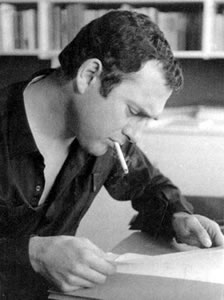
Harold Pinter (10 oktober 1930 – 24 december 2008)
De Franse schrijver Claude Simon werd geboren op 10 oktober 1913 te Tananarive (Madagaskar) als zoon van een Franse legerofficier. Zie ook alle tags voor Clauder Simon op dit blog en ook mijn blog van 10 oktober 2010 en ook mijn blog van 10 oktober 2009.
Uit: Discours de Stockholm
„Mesdames, Mesdemoiselles, Messieurs,
Sur les sentiments que peut éprouver un lauréat distingué par l’Académie Suédoise, l’un de mes « confrères Nobel », comme nous appelle le docteur André Lwoff dans une lettre qu’il a eu la gentillesse de m’adresser, s’est on ne peut mieux expliqué :
« La recherche étant un jeu, écrivait-il dans son remerciement, il importe peu, en théorie tout au moins, que l’on gagne ou que l’on perde. Mais les savants » (et je dirai aussi les écrivains), « les savants, donc, possèdent certains traits des enfants. Comme eux ils aiment gagner et comme eux ils aiment être récompensés »; à quoi André Lwoff ajoutait : « Au fond de lui-même, tout savant » (tout écrivain, dirai-je encore) « désire être reconnu ».
Et, si j’essaie d’analyser les composantes multiples de cette satisfaction par certains côtés puérile, je dirais que s’y mêle une certaine fierté qu’au-delà de ma personne l’attention se trouve ainsi attirée sur le pays qui pour le meilleur et pour le pire est le mien et où il n’est pas mauvais que l’on sache que, malgré ce pire, existe comme une obstinée protestation, dénigrée, moquée, parfois même hypocritement persécutée, une certaine vie de l’esprit, qui, en soi, sans autre but ni raison que d’être, fait encore de ce pays un des lieux où survivent, indifférentes à l’inertie ou parfois même à l’hostilité des divers pouvoirs, quelques-unes des valeurs les plus menacées d’aujourd’hui.
Je voudrais ensuite, en m’adressant aux membres de votre Académie, leur dire que, si je me tourne vers eux pour qu’ils sachent combien je suis sensible au choix qu’ils ont fait et les en remercier, ce n’est pas seulement pour sacrifier à un rite ou me soumettre à un simple usage de courtoisie.”
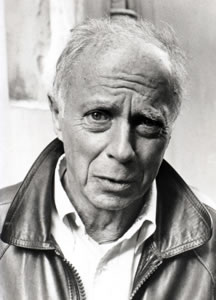
Claude Simon (10 oktober 1913 – 6 juli 2005)
De Antilliaanse (Curaçaose) schrijver Willem Cornelis Jacobus (Boeli) van Leeuwen werd geboren op 10 oktober 1922 op Curaçao. Zie ook mijn blog van 10 oktober 2010 en eveneens alle tags voor Boeli van Leeuwen op dit blog.
Uit: A Stranger on Earth (Vertaald door Olga E. Roger en Joesph O. Aimone)
„The first years of the marriage were very difficult for Maria-Teresa. As a human being she felt a certain charity toward the clumsy and vain man she had married. As a woman, she lived in terror of his scaly hands and bony body. No one knew how often in those years, on the brink of despair, she lay waiting in her bedroom for Janchi to return from the club, inflamed by the whiskey sodas and the crude jokes of his friends. She would feign sleep, in the hopes that he would not touch her. When he was sober, he would lie next to her and turn his back to her. A depressive silence would then grow in the room until neither dared to move. But when he was drunk, he would sometimes begin to caress her, and soon she would feel his member like an awakening animal against her hip. She would shudder in revulsion, and he would take her very quickly and roughly because he knew that she had no joy in their union. After the joyless act, they lay defeated in the warm room, spinning their bitter thoughts with wide-open eyes.
Afterwards Maria-Teresa often dreamt of an ancient dwarf who held her between his bony knees, while his hand crept over her body like a white crab. When the crab reached her lap, she would bolt awake screaming and would clasp herself tightly, not onto the man, but rather onto the human being, who lay next to her.
During that time, Janchi was already becoming a caricature of the jovial, prominent citizen in a small community. He joined the local lodge where he rose in rank in a short time; he became a member of three leading clubs, in which at an advanced age he would become honorary chairman, and he comported himself like a pillar of the community. In reality he was a mediocre businessman who often lost large sums of money and who in any other community than the community of Curacao would have fallen into poverty. His entire life he carried a mortgage on the excessively large home on Scharloo, and he was always in debt up to his protruding ears. Still, he was, like so many superficial people, a popular member of the community and well-liked by his friends, since he overshadowed no one with his mediocrity. He enjoyed giving speeches in his execrable Dutch: “Hit has wholly gotten itself from my remembering, Mister Overseer.” (2) He dressed his long and bony body with a certain flourish and,when greeting all women, would hold on to their hands a bit too long.”
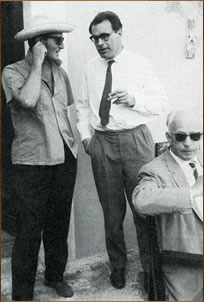
Boeli van Leeuwen (10 oktober 1922 – 28 november 2007)
Boeli van Leeuwen (links) met Godfriend Bomans (midden) op Curaçao
De Russische dichter en schrijver Ivan Aleksejevitsj Boenin werd geboren in Voronezj op 10 oktober 1870. Zie ook mijn blog van 10 oktober 2009 en ook mijn blog van 10 oktober 2010
Loneliness
The rain and the wind and the murk
Reign over cold desert of fall,
Here, life’s interrupted till spring;
Till the spring, gardens barren and tall.
I’m alone in my house, it’s dim
At the easel, and drafts through the rims.
The other day, you came to me,
But I feel you are bored with me now.
The somber day’s over, it seemed
You were there for me as my spouse.
Well, so long, I will somehow strive
To survive till the spring with no wife.
The clouds, again, have today
Returned, passing, patch after patch.
Your footprints got smudged by the rain,
And are filling with water by the porch.
As I sink into lonesome despair
From the vanishing late autumn’s glare.
I gasped to call after you fast:
Please come back, you’re a part of me, dear;
To a woman, there is no past
Once love ends, you’re a stranger to her;
I’ll get drunk, I will watch burning logs,
Would be splendid to get me a dog.
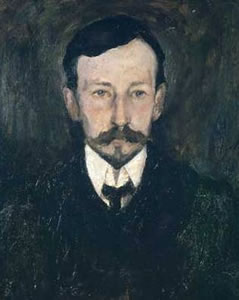
Ivan Boenin (10 oktober 1870 – 8 november 1953)
Portret door Leonard Turzhansky
De Amerikaanse schrijver Frederick Barthelme werd geboren op 10 oktober 1943 in Houston, Texas. Zie ook mijn blog van 10 oktober 2009 en ook mijn blog van 10 oktober 2010.
Uit: A City of Churches
“Yes,” Mr. Phillips said, “ours is a city of churches all right.”
Cecelia nodded, following his pointing hand. Both sides of the street were solidly lines with churches, standing shoulder to shoulder in a variety of architectural styles. The Bethel Baptist stood next to the Holy Messiah FreeBaptist, Saint Paul’s Episcopal next to Grace Evangelical Covenant. Then came the First Christian Science, the Church of God, All Souls, Our Lady of Victory, and the Church of the Holy Apostles. The spires and steeples of the traditional buildings were jammed in next to the broad imaginative flights of the “contemporary” designs.
“Everyone here takes great interest in church matters,” Mr. Philips said.
Will I fit in, Cecelia wondered. She had come to Prester to open a branch office of a car-rental concern.
“I’m not especially religious,” she said to Mr. Philips, who was in the real-estate business.
“Not now,” he answered. “Not yet. But we have many fine young people here. You’ll get integrated into the community soon enough. The immediate problem is where are you to live? Most people,” he said, “live in the church of their choice. All of our churches have many extra rooms. I have a few belfry apartments that I can show you. What price range were you thinking of?”
They turned a corner and were confronted with more churches. They passed Saint Luke’s, the Church of the Epiphany, All Saints Ukrainian Orthodox, Saint Clement’s, Fountain Baptist, Union Congregational, Saint Anargyri’s, Temple Emanuel, the First Church of Christ Reformed. The mouths of all thechurches were gaping open. Inside, lights could be seen dimly.
“I can go up to a hundred and ten,” Cecelia said. “Do you have any buildings that are not churches?”
“None,” said Mr. Philips. “Oh course, many of our fine church structures also do double duty as something else.” He indicated an handsome Georgian facade. “That one,” he said, “houses the United Methodist and the Board of Education. The one next to it, which is the Antioch Pentecostal, has the barbershop.”
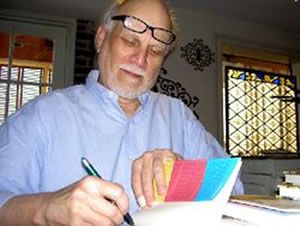
Frederick Barthelme (Houston, 10 oktober 1943)
